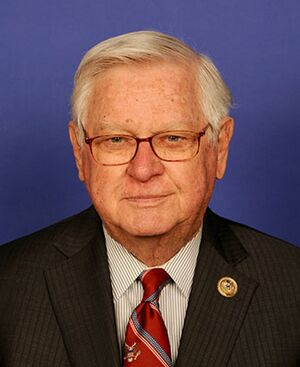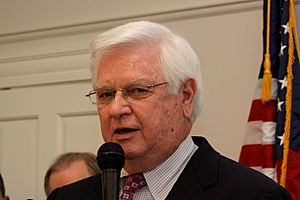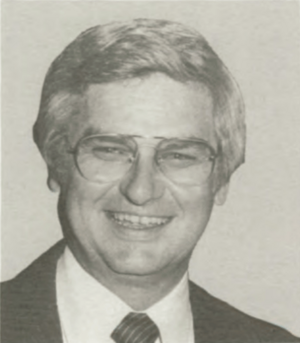Hal Rogers facts for kids
Quick facts for kids
Hal Rogers
|
|
|---|---|

Official portrait, 2018
|
|
| 46th Dean of the United States House of Representatives | |
| Assumed office March 18, 2022 |
|
| Preceded by | Don Young |
| Chair of the House Appropriations Committee | |
| In office January 3, 2011 – January 3, 2017 |
|
| Preceded by | Dave Obey |
| Succeeded by | Rodney Frelinghuysen |
| Kentucky | |
| Member of the U.S. House of Representatives from 's 5th district |
|
| Assumed office January 3, 1981 |
|
| Preceded by | Tim Lee Carter |
| Commonwealth's Attorney of the 28th Kentucky Circuit Court | |
| In office September 12, 1969 – January 3, 1981 |
|
| Preceded by | Charles Neikirk |
| Succeeded by | Lester Burns |
| Personal details | |
| Born |
Harold Dallas Rogers
December 31, 1937 Barrier, Kentucky, U.S. |
| Political party | Republican |
| Spouses |
|
| Children | 3 |
| Education | Western Kentucky University University of Kentucky (BA, LLB) |
| Website | |
| Military service | |
| Branch/service |
|
| Years of service | 1956–1963 |
| Rank | Staff Sergeant |
Harold "Hal" Dallas Rogers (born December 31, 1937) is an American lawyer and politician. He has served as a U.S. Representative for Kentucky's 5th congressional district since 1981. He is a member of the Republican Party.
In 2022, after the death of Representative Don Young, Rogers became the Dean of the United States House of Representatives. This title is given to the member of the House who has served the longest.
Rogers was born in Barrier, Kentucky. He earned degrees from the University of Kentucky. Before becoming a politician, he served in the Kentucky and North Carolina Army National Guard. He also worked as a lawyer.
In 1980, Rogers was elected to Congress. His district is considered a Republican stronghold, meaning most voters there support the Republican party. Because of this, he has usually won his elections by a large margin. He is currently serving his 23rd term in Congress.
Contents
Early Life and Career
Hal Rogers was born in Barrier, Kentucky. He went to Western Kentucky University and later earned two degrees from the University of Kentucky. From 1956 to 1963, he served in the Kentucky Army National Guard and the North Carolina Army National Guard.
After his military service, Rogers worked as a lawyer. In 1969, he was elected as the Commonwealth's Attorney for Pulaski and Rockcastle counties in Kentucky. A commonwealth's attorney is a type of prosecutor who represents the government in court cases. He held this job until he was elected to Congress in 1980.
In 1979, Rogers ran for Lieutenant Governor of Kentucky but did not win. The next year, he successfully ran for a seat in the U.S. Congress.
U.S. House of Representatives

Rogers is the longest-serving Republican from Kentucky ever elected to a federal office. He represents a district that has historically supported the Republican Party since the Civil War.
Working in Congress
Rogers is known for being a skilled negotiator who can work with both Democrats and Republicans. He often focuses on bringing money and jobs to his district in Kentucky, which is part of the Appalachian region.
For example, he came up with the idea for The Center for Rural Development, a non-profit organization in Somerset, Kentucky, that helps the local economy. In 2001, the city of Williamsburg, Kentucky, named its new water park the Hal Rogers Family Entertainment Center to thank him for bringing federal money to the area.
Even though he is a conservative, Rogers has sometimes voted differently from his party to support his district. In 1993, he was one of only three Republicans to vote for an economic plan from President Bill Clinton. He has also supported large environmental programs to clean up and protect the Appalachian region.
Legislation and Committee Work
As a member of the powerful House Appropriations Committee, Rogers has a lot of say in how the U.S. government spends money. For a time, he was the chairman of this committee.
Over the years, he has introduced several bills.
- One bill aimed to make the Mill Springs Battlefield in Kentucky a part of the National Park System. Rogers called the battlefield a "jewel" that honors an important Civil War battle.
- In 2014, he introduced a bill to provide $1 billion in loan guarantees to Ukraine after the Russian military intervention.
- He also introduced a bill to provide emergency funding to help federal agencies at the U.S. southern border.
For the 118th United States Congress, Rogers serves on the Committee on Appropriations and is the chair of the Subcommittee on Commerce, Justice, and Science.
Criticism
Some groups have criticized Rogers for how he uses his power in Congress. They say he directs too much federal money to projects in his home district. This is sometimes called "pork-barrel spending." Critics argue that this money could be better used in other parts of the country.
For example, one report said he used his influence to have a company in his district test technology for new permanent resident cards, even though a different approach was found to be better.
Rogers has defended his actions. He says his main goal is to create jobs and improve the economy in his district, which has faced economic challenges. He also states that his work on national security is meant to protect the entire country.
In 2022, Rogers had a disagreement with Representative Joyce Beatty on the United States Capitol subway system. He made a rude comment to her after she asked him to wear a face mask. He later issued a public apology to her.
Political Positions

Rogers is known for his conservative views. He is considered a moderate Republican by some because he sometimes works with Democrats on spending bills.
- Budget and Economy: Rogers supports a balanced budget amendment, which would require the government to not spend more money than it collects in taxes. He has voted for tax cuts and is against government bailouts of private companies.
- Gun Policy: In 2018, he co-sponsored and voted for a bill to improve school safety. The bill provided money for training students and teachers to spot signs of gun violence and for schools to add security like new locks and metal detectors.
- Crime: Rogers supports the death penalty and wants to expand the justice system for young people.
- Environment: He has a low rating from groups that support animal welfare because of his voting record.
- Immigration: Rogers supports making English the official language of the United States and building a fence along the U.S.-Mexico border.
Personal Life
Rogers was married to his first wife, Shirley, and they had three children. She passed away in 1995. He is now married to Cynthia Doyle.
In January 2024, Rogers was in a car crash near Washington, D.C. He was taken to a hospital but was reported to be in good condition. He returned to his work in Congress the next month.
Electoral History
| Year | Republican | Votes | % | Democratic | Votes | % | Third Party | Party | Votes | % | |||
|---|---|---|---|---|---|---|---|---|---|---|---|---|---|
| 1980 | Hal Rogers | 112,093 | 67% | Ted Marcum | 54,027 | 33% | |||||||
| 1982 | Hal Rogers | 52,928 | 65% | Doye Davenport | 28,285 | 35% | |||||||
| 1984 | Hal Rogers | 125,164 | 76% | Sherman McIntosh | 39,783 | 24% | |||||||
| 1986 | Hal Rogers | 56,760 | 100% | No candidate | |||||||||
| 1988 | Hal Rogers | 104,467 | 100% | No candidate | |||||||||
| 1990 | Hal Rogers | 64,660 | 100% | No candidate | |||||||||
| 1992 | Hal Rogers | 115,255 | 55% | John Hays | 95,760 | 45% | |||||||
| 1994 | Hal Rogers | 82,291 | 79% | Walter Blevins | 21,318 | 21% | |||||||
| 1996 | Hal Rogers | 117,842 | 100% | No candidate | |||||||||
| 1998 | Hal Rogers | 142,215 | 78% | Sidney Jane Bailey | 39,585 | 22% | |||||||
| 2000 | Hal Rogers | 145,980 | 74% | Sidney Jane Bailey | 52,495 | 26% | |||||||
| 2002 | Hal Rogers | 137,986 | 78% | Sidney Jane Bailey | 38,254 | 22% | |||||||
| 2004 | Hal Rogers | 177,579 | 100% | No candidate | |||||||||
| 2006 | Hal Rogers | 147,201 | 74% | Kenneth Stepp | 52,367 | 26% | |||||||
| 2008 | Hal Rogers | 177,024 | 84% | No candidate | Jim Holbert | Independent | 33,444 | 16% | |||||
| 2010 | Hal Rogers | 151,019 | 77% | Jim Holbert | 44,034 | 23% | |||||||
| 2012 | Hal Rogers | 195,408 | 78% | Kenneth Stepp | 55,447 | 22% | |||||||
| 2014 | Hal Rogers | 171,350 | 78% | Kenneth Stepp | 47,617 | 22% | |||||||
| 2016 | Hal Rogers | 221,242 | 100% | No candidate | |||||||||
| 2018 | Hal Rogers | 172,093 | 78% | Kenneth Stepp | 45,890 | 21% | Billy Ray Wilson | Independent | 34 | 1% | |||
| 2020 | Hal Rogers | 250,914 | 84% | Matthew Best | 47,056 | 16% | |||||||
| 2022 | Hal Rogers | 177,714 | 82% | Conor Halbleib | 38,549 | 18% | |||||||
| 2024 | Hal Rogers | 261,407 | 100% | No candidate |


